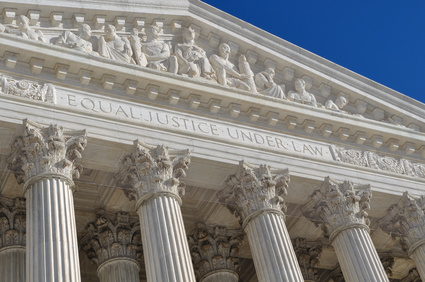The U.S. Court of Appeals for the Seventh Circuit recently held that the presence of capital as one of six components in the FDIC’s CAMELS rating does not mean that the rating as a whole is committed to agency discretion for the purpose of 5 U.S.C. §701(a)(2) and therefore unreviewable. A copy of the opinion in Builders Bank v. FDIC is available at: Link to Opinion. As you may recall, the FDIC is charged with conducting a full-scope on site examination every 12-18 months of the banks whose deposits it insures. In June 2015, the FDIC examined a bank and…
Posts published in January 2017
The U.S. Court of Appeals for the Third Circuit recently reversed the dismissal of a putative class action under the federal Fair Credit Reporting Act (FCRA) based on the theft of laptops from a health insurer containing sensitive personal information, holding that the plaintiffs had standing to sue because Congress created a statutory remedy for the unauthorized transfer of personal information, the disclosure of which constituted a cognizable injury, regardless of whether the stolen information was actually used improperly. A copy of the opinion in In re Horizon Healthcare Inc. Data Breach Litigation is available at: Link to Opinion. The…
The Appellate Division of the Circuit Court of the Fifteenth Judicial Circuit in and for Palm Beach County, Florida recently reversed summary judgment in favor of a mortgage loan servicer in a case filed by a borrower under the Florida Consumer Collections Practices Act (FCCPA), holding that: (a) the account statement at issue improperly attempted to collect a debt that was no longer owed, and was not preempted by the federal Truth in Lending Act (TILA); and (b) sending the statement to the borrower’s attorney did not avoid liability because the “competent lawyer” standard adopted by the Seventh Circuit does…
The Supreme Court of the United States recently held that the “sue-and-be-sued” clause in the Federal National Mortgage Association’s (“Fannie Mae”) charter does not confer subject matter jurisdiction on federal district courts over all cases involving Fannie Mae, and that an independent basis for subject matter jurisdiction must exist such as federal question or diversity. A copy of the opinion in Lightfoot v. Cendant Mortgage Corp. is available at: Link to Opinion. Justice Sotomayor’s opinion began by reciting the history of Fannie Mae, which began with the federal government’s attempts to stabilize and strengthen the residential mortgage market during the…
SCOTUS to Decide Whether Entity is FDCPA ‘Debt Collector’ Merely Because It Purchases Defaulted Debt

The Supreme Court of the United States recently decided that it will review the decision of the U.S. Court of Appeals for the Fourth Circuit in Henson v. Santander Consumer USA, Inc. As you may recall from our prior update, the U.S. Court of Appeals for the Fourth Circuit held that the fact that a debt is in default at the time it is purchased by an entity does not necessarily make that entity a “debt collector” subject to the federal Fair Debt Collection Practices Act (FDCPA), 15 U.S.C. § 1692 et seq. A link to the docket is available…
The U.S. Supreme Court heard oral argument Tuesday in Midland Funding v. Johnson. A primary issue before the Court is whether the federal Fair Debt Collection Practices Act is violated by the filing in a Chapter 13 bankruptcy case of a proof of claim representing a debt subject to an expired limitations period. The case originated from the Eleventh Circuit Court of Appeals, which along with its earlier decision in Crawford v. LVNV, held the FDCPA is violated in those instances. Every other Circuit Court of Appeals has since found otherwise. The oral argument indicated that at least six justices…
The U.S. District Court for the Middle District of Florida recently granted in part a mortgage loan servicer’s motion to dismiss a consumer borrower’s claims under the federal Fair Debt Collection Practices Act (FDCPA), the Florida Consumer Collection Practices Act (FCCPA), the Real Estate Settlement Procedures Act (RESPA), the federal Fair Credit Reporting Act (FCRA), and the federal Declaratory Judgment Act (DJA), holding: (a) the borrower’s complaint stated claims under the FDCPA and FCCPA because the allegations raised a plausible inference that the servicer knew the borrower was represented by counsel; (b) the borrower’s allegations that the statute of limitations…
The U.S. Court of Appeals for the Ninth Circuit recently held that class action plaintiffs are not required to demonstrate that there is an administratively feasible way to determine who is in a class in order for the class to be certified. In so ruling, the Ninth Circuit noted that the Sixth, Seventh, and Eighth Circuits have similarly ruled. See Sandusky Wellness Ctr., LLC v. Medtox Sci., Inc., 821 F.3d 992, 995–96 (8th Cir. 2016); Rikos v. Procter & Gamble Co., 799 F.3d 497, 525 (6th Cir. 2015); Mullins v. Direct Digital, LLC, 795 F.3d 654, 658 (7th Cir. 2015),…
The U.S. Court of Appeals for the Seventh Circuit recently held that a mortgage servicer’s response to a borrower’s written request for information complied with requirements of the federal Real Estate Settlement Procedures Act (RESPA) and, to the extent any information was missing, the borrower suffered no actual damages as a result. In so ruling, the Seventh Circuit rejected the borrowers’ pattern or practice argument under RESPA, based on two district court cases in 2012 and 2014 holding the servicer liable for RESPA violations, because “[t]wo examples of similar behavior — in different states, separated by a handful of years,…
The Court of Appeal of the State of Florida, Third District, recently reversed summary judgment in favor of a mortgagee-loss payee under a homeowner’s insurance policy, holding that the mortgagee failed to provide evidence of the value of the property after repairs, and therefore failed to show that repairing the property was not economically feasible. A copy of the opinion Alvarez-Mejia v. Bellissimo Properties, LLC, et al. is available at: Link to Opinion. A consumer took out a purchase money loan for $120,000 secured by a mortgage on the residential property. The original lender assigned the mortgage to two fractional…
A New Jersey federal District Court recently granted a debt collector’s motion for summary judgment in a claim arising from service fees where the collection account at issue did not belong to the debtor. A copy of the opinion in Benali v. AFNI is available at: Link to Opinion. The plaintiff received a dunning letter from a collector allowing him to make payments by phone or online subject to a $4.95 processing fee. Similar payments made by mail would not be subject to the processing fee. Although the account at issue did not belong to him, the plaintiff filed suit…
The U.S. Court of Appeals for the First Circuit recently affirmed a bankruptcy court’s ruling that a mortgagee did not violate the discharge injunction in 11 U.S.C. § 524(a) by sending IRS 1099-A forms to borrowers after their discharge, agreeing that the IRS forms were not objectively coercive attempts to collect a debt. A copy of the opinion in Bates v. CitiMortgage, Inc. is available at: Link to Opinion. The borrowers obtained a mortgage loan secured by their home. They filed bankruptcy under Chapter 7 in 2008 and received a discharge of their personal liability for the loan in 2009.…











